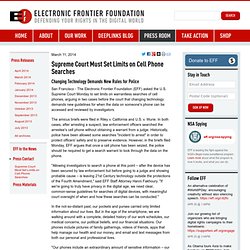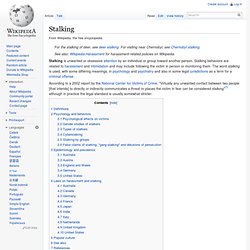

FISA. Rights i believe in. One Hundred Naked Citizens: One Hundred Leaked Body Scans. Privacy / Survival of Humans. Thomas Jefferson Quotes. FOIA.gov - Freedom of Information Act. Defending your rights in the digital world. International Community Unites to Protest Big Brother. Zillow: Real Estate, Apartments, Mortgage & Home Values in the US. Supreme Court Must Set Limits on Cell Phone Searches. San Francisco - The Electronic Frontier Foundation (EFF) asked the U.S.

Supreme Court Monday to set limits on warrantless searches of cell phones, arguing in two cases before the court that changing technology demands new guidelines for when the data on someone's phone can be accessed and reviewed by investigators. The amicus briefs were filed in Riley v. California and U.S. v. Stalking. Stalking is unwanted or obsessive attention by an individual or group toward another person.

Stalking behaviors are related to harassment and intimidation and may include following the victim in person or monitoring them. The word stalking is used, with some differing meanings, in psychology and psychiatry and also in some legal jurisdictions as a term for a criminal offense. According to a 2002 report by the National Center for Victims of Crime, "Virtually any unwanted contact between two people [that intends] to directly or indirectly communicates a threat or places the victim in fear can be considered stalking"[1] although in practice the legal standard is usually somewhat stricter. Definitions[edit] The difficulties associated with precisely defining this term (or defining it at all) are well documented.[2]